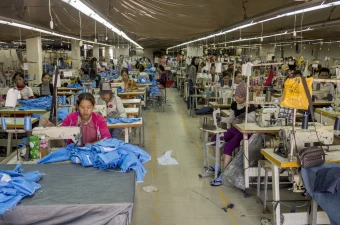The focus of the 4th HUMAN conference the 16th of June was on "social impact". CNV Internationaal encourages companies to move past the 'do no harm' phase towards 'do good' and ‘creating shared value’.

Improving labour rights -a specific subset of our human rights- is a worldwide goal for trade union CNV Internationaal and its partner organisations. Specifically, CNV Internationaal has the objective to reduce poverty and to contribute to Decent Work in developing countries based on international solidarity, own responsibility, social dialogue and pluralism. This is why trade unions focus on the living and working conditions of the workers in the production chain when discussing the social impact in responsible chain management.
Long-term ambitions
CNV encourages companies to move past the 'do no harm' phase of the transition model towards 'do good' and ‘creating shared value’. In relation to a company’s employees, ‘creating shared value’ means creating mutually beneficial situations. CNV Internationaal wants companies to be aware of the positive effects of respecting and enforcing the rights of their employees for them.
CNV Internationaal wants to move towards shared value by use of effective social impact measurement and management practices. Social impact measurement will reveal important management information for a company: it reveals what the actual added social value is of the company’s corporate social responsibility strategies.
The area of labor rights
The corporation’s positive social value could be related to workplace safety, fair wage and working hours, employment conditions or social security, all of which in the long run will improve the lives and wellbeing of the employees and their families.
The company will benefit from more satisfied and motivated workers: employees working in a safe environment and for a decent wage are less likely to be absent and more likely to be loyal to the company. Furthermore, satisfied workers in general will contribute to peace and stability on the work floor, which shall lead to growth in production and improve the quality of the products and/or services delivered.
Local impact of companies activities
CNV Internationaal would like to see that companies structurally work together with local trade unions and use their feedback, experience and knowledge about the local impact of the company’s activities for the continuous development of their CSR strategy. One example of this is JJH Textiles, a company in Bangladesh that on a regular basis discusses social issues and their potential social value creation for the lives of workers in their factories with BSSF, a local trade union.
Short-term expectations
CNV expects companies to have made an explicit policy commitment to internationally accepted labour standards. There is a wide range of international human and labour rights instruments, but CNV Internationaal specifically refers to the Universal Declaration of Human Rights, the OECD guidelines for multinational companies, and the United Nations Guiding Principles. In general, key labour rights are:
• Freedom of association and the effective recognition of the right to collective bargaining
• Elimination of all forms of forced or compulsory labour
• Effective abolition of child labour
• Elimination of discrimination in respect of employment and occupation
• Living wage
Compliance with labour standards is crucial
To comply with the corporate responsibility to respect, i.e. to ‘do no harm’, compliance with these internationally recognised labour standards is crucial. Freedom of association gives a voice to employees. A voice to speak about important issues that can bring real social change in their lives, such as a fair living wage, a safe work environment, social security systems, and increased employability.
In this sense, freedom of association should be your first step in initiating your stakeholder dialogue and in allowing your stakeholders to share their organised perspectives on their needs and interests with you. It is the first step in providing for effective feedback for your materiality matrix.
Using (products produced with) forced or compulsory labour or child labour, allowing for discrimination of employees on whatever grounds, and underpaying your employees are key practices that should be abandoned by any company, no matter what its context is. Ask yourself and your suppliers within the value chain three key questions:
• Do workers throughout the value chain enjoy the right of freedom of association?
• How do suppliers make sure there are no forms of forced or compulsory labour in their businesses?
• Do employees earn a fair living wage?
If any of these questions is answered insufficiently, companies should make it their primary strategic human rights target, and develop KPIs to solve the issue as soon as possible. Furthermore, companies should ask themselves whether their strategic goals are formulated as such to mitigate risks, or also to generate positive and measurable impact on the societies in which they operate.
Any company, no matter its size, that considers its human rights performance part of its strategic business activities, benefits from investing in implementation, measurement and monitoring mechanisms to realize its policies.
These mechanisms are essential for steering and understanding the social impact the company has: how are policies and strategic goals implemented in practice, and how do the company’s corporate social responsibility activities actually contribute to the achievement of these goals, for example when it comes to labour law compliance? This relates back to the transition model: do not only focus on input and output, but also measure the outcome:
- Do workers actually benefit from an improved social security system?
- And if not, what are the obstacles you must overcome?
- How can you measure your actual improvement on the issue?
The fourth question you should consequently ask yourself is:
- How do your policies contribute (positively or negatively) to an increase in actual social value for society?
Meaningful stakeholder dialogue
CNV Internationaal recommends companies to use the instrument of meaningful stakeholder dialogues in establishing and measuring their social impact. Local trade unions, for example, can be a highly useful source of information on local labour laws because they check compliance with labour laws regularly and they often contribute to national discussions on mitigation and prevention of labour rights violations.
With this knowledge, their local network and their specific skills, local trade unions can help companies to arrive step wise at a structural approach for creating social value through their business activities.
Also, local trade unions can support local suppliers throughout the value chain in monitoring to assure implementation of human rights is more than a box- ticking-exercise. In other words, because of their knowledge and position in the local society trade unions are good partners for external assurance.
SMEs vs MNCs – different expectations?
Every organisation can measure its social impact. It should not be reserved to social enterprises or multinationals only. Small and medium-sized businesses can start with 1 or 2 social KPIs. Define the different steps for the company's social value ambition based on the company’s core business and the specific context in which the company could create value.
Step-by-step approach
An example of the step-by-step approach could be:
- By 2016 freedom of association should be discussed with all suppliers in all countries where companies produce their goods.
- In 2016 the wages throughout the production chain should be mapped out.
- In 2017 policies and implementation phases are formulated for countries x and y to move from the current wage levels towards a negotiated living wage in 2020 by a phased approach.
As you can see, you can add other KPIs over time; thus, also smaller companies can start working on creating social value on their own level and in their own geographies.
Further reading on this subject:
Publication date 17 06 2015


